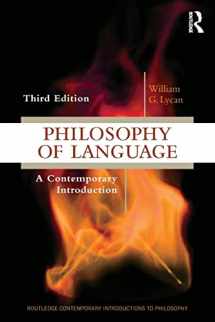
Philosophy of Language: A Contemporary Introduction (Routledge Contemporary Introductions to Philosophy)
Book details
Summary
Description
Now in its third edition, Philosophy of Language: A Contemporary Introduction introduces students to the main issues and theories in twenty-first-century philosophy of language, focusing specifically on linguistic phenomena. Author William G. Lycan structures the book into four general parts. Part I, Reference and Referring, includes topics such as Russell's Theory of Descriptions (and its objections), Donnellan's distinction, problems of anaphora, the Description Theory of proper names, Searle's Cluster Theory, and the Causal-Historical Theory. Part II, Theories of Meaning, surveys the competing theories of linguistic meaning and compares their various advantages and liabilities. Part III, Pragmatics and Speech Acts, introduces the basic concepts of linguistic pragmatics and includes a detailed discussion of the problem of indirect force. Part IV, The Expressive and the Figurative, examines various forms of expressive language and what "metaphorical meaning" is and how most listeners readily grasp it.
Features of Philosophy of Language include:
- chapter overviews and summaries;
- clear supportive examples;
- study questions;
- annotated lists of further reading;
- a glossary.
Updates to the third edition include:
- an entirely new chapter, "Expressive Language" (Chapter 14), covering verbal irony, sarcasm, and pejorative language (particularly slurs);
- the addition in several chapters of short sections on pretense theories, addressing (1) puzzles about reference, (2) irony, and (3) metaphor;
- a much expanded discussion of Relevance Theory, particularly its notion of ad hoc concept construction or "loosening and tightening," and the application of that to metaphor;
- new discussion of Cappelen and Lepore's skepticism about content-dependence;
- up-to-date coverage of new literature, further reading lists, and the bibliography, as well as an improved glossary.


We would LOVE it if you could help us and other readers by reviewing the book
Book review



